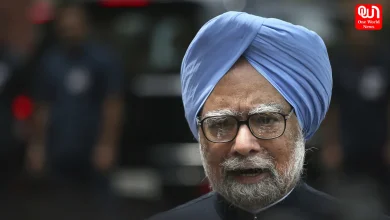Subhas Chandra Bose’s Enigmatic Demise: Flight to Soviet Union Ends in Tragic Crash
Subhas Chandra Bose's death anniversary reflects his choice to continue India's struggle. A flight to the Soviet Union was planned, tragically ending in a crash, leaving his legacy enigmatic.
Subhas Chandra Bose’s death anniversary recalls his decisive choice to continue India’s freedom struggle.
On the occasion of Subhas Chandra Bose’s death anniversary, we delve into the events leading up to his untimely demise, which still remains shrouded in mystery. A prominent figure in India’s fight for independence against British rule, Bose’s fate took a dramatic turn on the morning of August 17, 1945.
Having arrived in Saigon from Bangkok along with his cabinet colleagues and senior Japanese officers, Bose found himself at a crossroads. With World War II concluded and Japan’s surrender to the Allies announced, he faced a crucial decision. He could either surrender India’s destiny to the British government or persist in his mission to liberate the nation from colonial rule.
Read more:- “BJP and RSS do not reflect Netaji’s ideology”; “poles apart”: Netaji’s Daughter

Opting for the latter, Bose envisioned seeking refuge in the Soviet Union alongside his fellow compatriots. Japanese Field Marshal Tarauchi devised a meticulous plan to facilitate Bose’s journey to the Soviet Union. General Isoda of the Japanese military was tasked with executing this covert operation. Bose emphasized to Isoda that some of his officers needed to accompany him, as the mission aimed not only to seek shelter but to sustain the struggle for India’s freedom.
Read more:- 126th birth anniversary of Netaji Subhash Chandra Bose
The pivotal moment arrived on August 18, as a plane containing 11 Japanese occupants, Bose, and his treasure boxes took off from Tourane at sunrise. Laden with fuel, the aircraft headed for Taihoku, with a scheduled stop at Dairen in Manchuria. An agreement was reached for Bose to travel to Mukden (Shenyang), the capital of Manchuria, alongside Japanese Army Lieutenant General Shidei.
However, tragedy struck as the plane ascended to an altitude of 20-30, marked by a sudden explosion followed by several loud noises. The aircraft, carrying Bose, plummeted, losing a propeller in the process. The impact upon landing on the concrete runway led to the plane’s fragmentation.
Subhas Chandra Bose’s legacy endures, and the events preceding his tragic demise continue to captivate and intrigue, leaving his ultimate fate a subject of ongoing speculation and discussion.
Liked this post?
Register at One World News to never miss out on videos, celeb interviews, and best reads.








